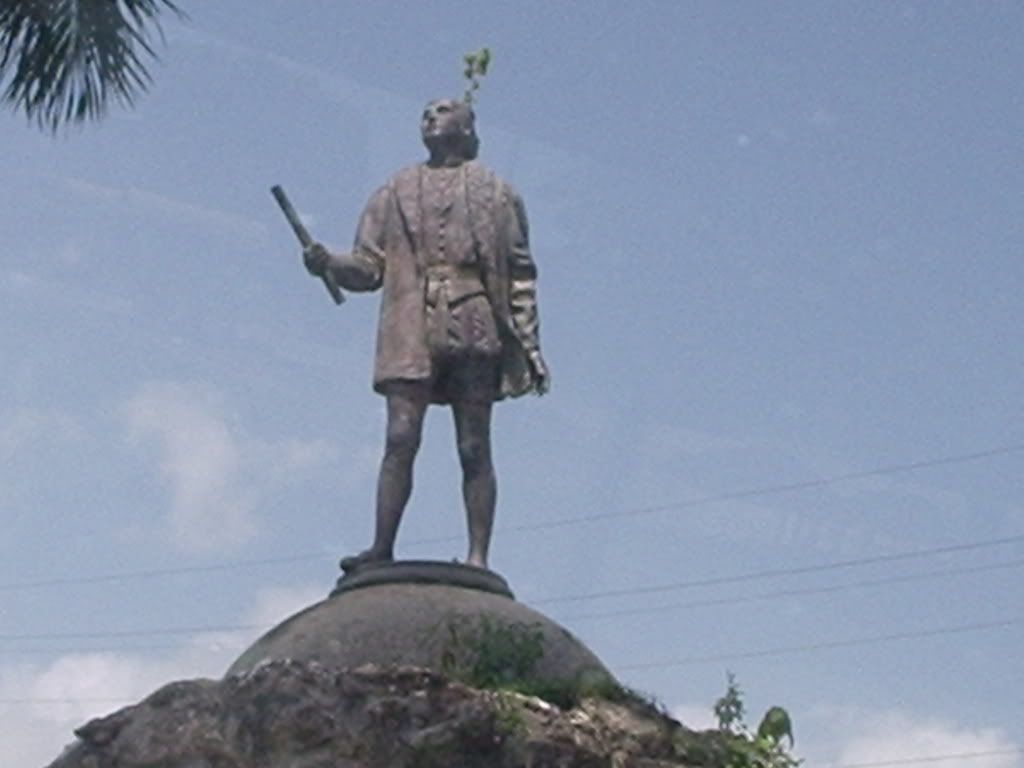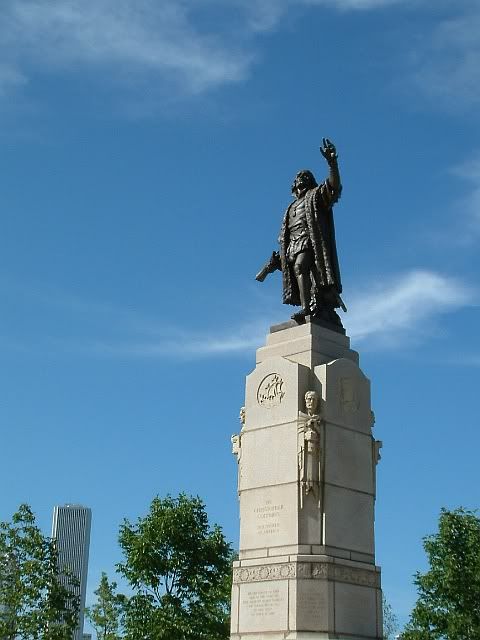Christopher Columbus:

The Christian Crusades had ended in 1291, the Black Death had been deliberately blamed on innocent Jews who said what their Christian torturers forced them to, that they poisoned water wells, causing the Black Death. But no sooner had the plague ceased than we saw the contrary . . . [People] gave themselves up to a more shameful and disordered life than they had led before.... Men thought that, by reason of the fewness of mankind, there should be abundance of all produce of the land; yet, on the contrary, by reason of men's ingratitude, everything came to unwonted scarcity and remained long thus; nay, in certain countries . . Christopher Columbus was born in 1451, barely over a century later in the city - state of Genoa, Italy after the newest Christian Campaign to exterminate the European Jews. Columbus educated himself, and his father was a wool merchant (3). Columbus was a map maker and a sailor in his forties; consequently, he knew that the world was round. What were three of the motivations that led him to set sail on August 3, 1492 on the Pinta, the Nina, and the Santa Maria from the "Southern Spanish port of Palos?" Greed for gold, capitalistic greed through the potential of wealth through the slave trade, and the religious beliefs of Apocalyptic Christianity were three primary motivations Columbus had for setting sail; consequently, which fueled genocide against tens of millions of Indigenous People. One of Columbus's motivations was greed for gold, which he acquired on the Gold Coast in the Portuguese colony (3). "Gold is most excellent; gold is treasure, and he who possesses it does all he wishes to in this world." [2] Another of Columbus's motives for making the journey was his capitalistic greed through the potential of wealth through the slave trade, which resulted in more and more slavery because of the desire for sugar and led to the atrocities of the Middle Passage. Sugar cane was the number one crop that produced the growth for Europe. It was brought to the New World from Spain by Christopher Columbus, later shipped to the rest of Europe. The growing sugar industry called for the usage of African slaves. Also the African slave labor and the plantations are what formed the Americas. The work that was performed on the plantations which, produced large quantities of sugar, created an even greater need for slaves, by the enslaved Africans brought to the Atlantic World by the Middle Passage. During those same long centuries they had further expressed their ruthless intolerance of all persons and thugs that were non-Christian by conducting pogroms against the Jews who lived among them and whom they regarded as the embodiment of the Antichrist imposing torture exile and mass destruction on those who refused to succumb to evangelical persuasion. Columbus was possessed with the obsession that Christ would return only if the Gospel was spread far and wide. Apocalyptic Christianity taught him: that either a savior in human form would prepare the way for Christ to return in the midst of a war between good and evil and history would end; or, that after the earth suffers dire consequences, evil would increase while love would decrease, then Christ would return with the Final Judgment and end history; or, that a period of peace would precede the Final Judgment. During this "period of peace," the Jews would be converted, while "the heathens would be either converted or annihilated." I think the latter best reflects Columbus's personal view of Apocalyptic Christianity. I will state why after a couple less known facts in order to set up a contrast. The Indigenous People very well may have had a much better future then and history now if Christopher Columbus had perished in the Atlantic on February 14, 1493. For the first European to land in America was Leif Ericson, a Viking seaman from Greenland (see Ericson). The ancient sagas give different accounts of this voyage made in the year 1000. The Norse left "no discernable impact." I cannot answer why that is, except to note that Viking voyages decreased and ended during the slow process of the Christianization of Scandinavia. So by contrast, Columbus had an enormous impact that is more far reaching than he could have imagined. Ironic indeed, since he grossly underestimated the earth's size prior to setting sail. For example, "He thought that Japan lay only three thousand miles from the southern European Coast (3)." He may then have also grossly underestimated the sheer mass numbers of Indigenous Population in the lands he did not first discover in the Americas. No matter though, for such "heathens" would either have to be "converted or annihilated." To be sure, the real annihilations did not start until the beginning of Columbus' second voyage to the Americas in 1493 (1). For while he had expressed admiration for the overall generosity of Indigenous People (1) and considered the Tainos to be "Very handsome, gentle, and friendly," he interpreted all these positive traits as signs of weakness and vulnerability, saying "if devout religious persons knew the Indian Language well, all these people would soon become Christians (3)." As a consequence, he kidnapped some of the Tainos and took them back to Spain. Indeed, he did subject everyone he had the power to subject. On his second voyage, in December 1494, Columbus captured 1,500 Tainos on the island of Hispaniola and herded them to Isabela, where 550 of ''the best males and females'' were forced aboard ships bound for the slave markets of Seville. Under Columbus's leadership, the Spanish attacked the Taino, sparing neither men, women nor children. Warfare, forced labor, starvation and disease reduced Hispaniola's Taino population (estimated at one million to two million in 1492) to extinction within 30 years. ...It is estimated that 100 million Indians from the Caribbean, Central, South, and North America perished at the hands of the European invaders. Sadly, unbelievably, really, much of that wholesale destruction was sanctioned and carried out by the Roman Catholic Church and various Protestant denominations. (1: p.37) Columbus' "successes," all crimes against humanity, are now more so in these modern times. A day is now in his honor since 1971 (4). That's one success. Here are more of Columbus' "successes" from a book I highly recommend buying. As Moyers pointed out, this "mentality" and blind acceptance of biblical inerrancy, which contributed to the genocide of American Indians during Columbus' time, has, in many ways, continued and continues to inform U.S. foreign policy, including its dealings with its own sovereign Indian Nations. (Bold mine) "We shall take you and your wives and your children, and shall make slaves of them, and as such shall sell and dispose of them as their Highnesses may command; and we shall take away your goods, and shall do all the harm and damage that we can." [11] Mark Twain: "History doesn't repeat itself, but it does rhyme." Native Alaska Villages will probably have to relocate, because the ice is melting underneath them. If Native people do not challenge the fundamental premise of the ''doctrine of discovery,'' as celebrated every year through Columbus Day, then the racist foundation upon which all federal Indian law and policy is constructed will remain intact. We see the ideology of domination carried to this hemisphere by Columbus playing out every year all over Indian country. We see it in the level of Indian incarceration, in the loss of religious freedom cases, in Indian child welfare cases where non-Indian courts ignore the law, in treaty cases where the United States ignores international standards, in international practice where the United States voted against the adoption of the U.N. Declaration on the Rights of Indigenous Peoples, and in the Cobell trust fund case where the United States refuses to account for tens, if not hundreds, of billions of dollars that are owed to Individual Indian Money trust accounts." Sources: (1): Kurt Kaltreider, PH.D. "American Indian Prophecies." pp. 49-57. (2): Jared Diamond. "Guns, Germs, And Steel." pp. 67, 79. (3): Norton. Katzman. Escott. Chudacoff. Paterson. Tuttle. "A People & A Nation." pp. 20 - 23. (4): Four Arrows (Don Trent Jacobs). "Unlearning the Language of Conquest." pp. 20, 236, 31, 275.
Of course, the real cause was in the stomachs of fleas, not planetary alignment, earthquakes, or God's Judgment. Nonetheless, the extermination of European Jews began in 1348 again, along with a key notorious origin of Manifest Destiny.
Source
Christopher Columbus: The Untold Story
Christopher Columbus:
Source
Here is a map that provides a good overview.
The religious beliefs of Apocalyptic Christianity were yet another one of Columbus' motivations for setting sail; consequently, it was the most illogical motivation he possessed. For his greed for gold could be coldly construed as a more practical reason, except for all of the Indigenous People he would in the future have to exterminate to get it, which he probally did not yet know of at the time. He had only ventured to the Gold Coast. His use of the slave trade for monetary gain was illogical enough, for it denied the very humanity of the African People and the Indigenous People that he would force into slavery; however, his beliefs regarding Apocalyptic Christianity were projected outwards towards the entire world.
Source
As for contacts of New World peoples with Europe, the sole early ones involved the Norse who occupied Greenland in very small numbers between A.D. 986 and about 1500. But these Norse visits had no discernible impact on Native American societies. (2)
It would be easy, he asserted, to "subject everyone and make them do what you wished (3)."
Source
Furthermore, Columbus wrote a letter to the Spanish governor of the island, Hispaniola. Columbus asked the governor the cut off the ears and the noses of any of the slaves who resisted being subjugated to slavery.
Greed for gold, capitalistic greed through the potential of wealth through the slave trade, and the religious beliefs of Apocalyptic Christianity were three primary motivations Columbus had for setting sail. He was successful in his aims, which fueled genocide against tens of millions of Indigenous People. He was successful in promoting and aiding in establishing slavery by bringing sugar to Europe and to the New World from Spain, which created the evil necessity in the eyes of some of humanity's greatest criminals for the Middle Passage, where slaves packed like cargo between decks often had to lie in each other's feces, urine, and blood.
Unlearning the Language of Conquest: Scholars Expose Anti-Indianism in America (Paperback) by Four Arrows (Don Trent Jacobs) (Editor). p. 237.
Christopher Columbus: The Untold Story
Opinion: Why Natives must reject Columbus Day
Labels: winter rabbit





